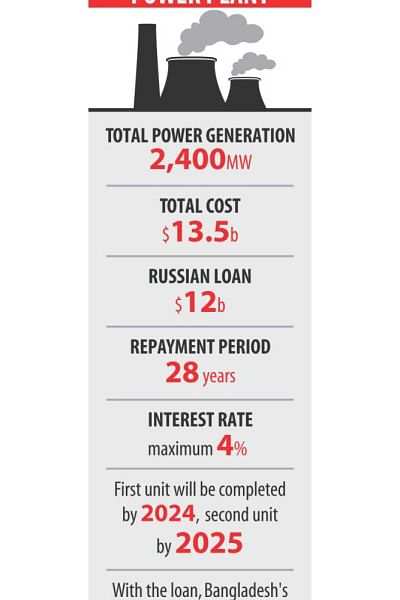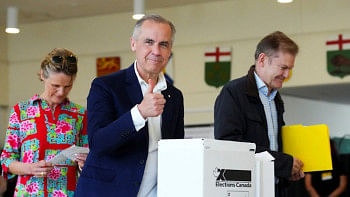Nuclear power plant to cost $13.5b

Bangladesh may have to spend around $13.5 billion to build the 2,400-megawatt Rooppur nuclear power plant, Finance Minister AMA Muhith said yesterday.
Of the cost, $12 billion will come from the Russian government in loans and the rest from the Bangladesh side, he said.
The minister was briefing reporters after a meeting with a delegation of Russia's state-owned Rosatom State Atomic Energy Corporation at the secretariat in the capital.
The Rosatom delegation led by its Deputy Chief Executive for International Relations Nikolay Spassky told the minister that they wanted to sign a construction deal within a month to start building the plant's two units and then a credit agreement in April next year.
Usually, credit agreements are signed first and then construction deals.
Muhith told reporters that the government might consider Rosatom's proposal. "However, we will have to hold inter-ministerial meeting and consult with the prime minister."
"We will send our feedback to Russia by next month," said Muhith.
Rosatom is keen to sign the construction contract first since it takes long to install equipment for a nuclear power plant, he said.
According to Rosatom, the main construction work will start in 2017. The first unit is expected to go into production in 2022 and the second one in 2023.
Muhith, however, said the government thinks it might take a longer period to complete the project. The first unit could be completed in 2024 and the second one in 2025.
Preparatory work to build the plant is underway under a $500-million technical assistance from Russia, said the minister.
Interest rate for the Russian loan has not been fixed yet.
Muhith, however, said it would be a maximum of 4 percent, and the repayment period would be 28 years with a grace period of 10 years. The loan is neither concessional nor commercial.
In case of commercial loans from the Asian Development Bank, Bangladesh normally pays service charge of around 4 percent, with repayment period of 20 years.
In June, Rosatom submitted a feasibility report on the plant to Bangladesh Atomic Energy Commission.
The Russian corporation said the plant would use a new generation reactor that has a lifespan of 60 years with an option of extending it for 20 years.
The reactor contains improved safety features, and its passive safety system is capable of working for 72 hours in case of any critical or emergency situation, it said.
Rosatom will maintain the plant for the first year of its commercial operation before handing over its control to the Bangladesh authorities.
"We may float an international tender to award the job of running the plant. Even, we may ask them [Rosatom] to continue to do it," said Muhith.
Rosatom will bear fuel costs for the first year of operation, and Bangladesh thereafter.
Muhith said the fuel costs would gradually come down.
He couldn't say what the production cost of a unit (kilowatt-hour) of electricity at the plant would be.
The minister, however, said it would be much less than that of electricity produced in plants, which run on fossil fuel or coal.
Muhith said the Russian loan for the plant would be a major debt burden, considering the current level of Bangladesh's foreign borrowing.
The country's debt burden is now $18 billion, which will go up to $30 billion after five years at the current pace of external borrowing.
The amount would reach $42 billion if the Russian loan is added to it.
Asked whether Bangladesh's economy will come under strain in repaying the loans, he said, "Yes, we will face pressure the way we service the debt now. However, it is quite low if we compare it with the standard debt burden."
Muhith said it takes around seven years to develop a workforce for maintaining a nuclear power plant.
The government already sent some Bangladeshi scientists to Russia to gain knowledge about nuclear power plants. Russia asked Bangladesh government to send another group of 25 by September next year, he said.
A total of 250 Bangladeshis will receive hands-on training in Russia.
In 2009, the government had initially estimated that the nuclear power plant would cost between $3 billion and $4 billion.
However, similar plants are now being built by Russia in different countries with price tags ranging from $10 billion to $13 billion.
Bangladesh has stepped up efforts to diversify its energy sources for producing power, as the country's gas reserve is depleting fast.
Once operational, the nuclear power plant would ensure significant energy diversity for the country, said government officials.

 For all latest news, follow The Daily Star's Google News channel.
For all latest news, follow The Daily Star's Google News channel. 



Comments